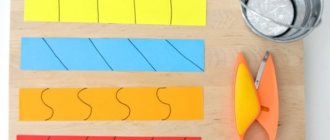Consultation for parents: “Healthy children - in a healthy family”
Topic: “ Healthy children in a healthy family ”
(Consultation for parents)
Prepared by psychologist: Evmushkova O.Yu.
Consultation for parents “Healthy children in a healthy family”
Every person associates the idea of happiness with family. Family is a support, a fortress, the beginning of everything. This is the child’s first team, a natural environment where the foundations of the child’s future personality and health are laid. In preschool childhood, the foundation of a child’s health is laid, intensive growth and development occurs, basic movements, posture, as well as the necessary skills and habits are formed, basic physical qualities are acquired, character traits are developed, without which a healthy lifestyle is impossible.
Prolonged stay in unfavorable conditions causes overstrain of the body's adaptive capabilities and leads to depletion of the immune system. Chronic diseases arise.
The increase in the number of diseases is associated not only with the socio-ecological situation, but also with the very lifestyle of the child’s family, which largely depends on family traditions and the nature of the motor regime.
Today it is important for us, adults, to form and maintain an interest in improving the health of both ourselves and our children. Parents are the first teachers. You are obliged to lay the foundations for the physical, moral and intellectual development of the child’s personality. Being healthy is a natural human desire. Health means not only the absence of disease, but also mental and social well-being.
What can
parents to introduce their children to a healthy lifestyle ?
It is necessary to actively use healing natural environmental factors:
clean water, ultraviolet rays of sunlight, clean air, phytoncidal properties of plants, since the natural forces of nature are familiar components of the environment and are necessary for the life of the body.
A child needs a calm, friendly psychological climate in
the family .
Quarrels in the presence of a child in some cases contribute to the development of neurosis in him, and in others aggravate existing disorders of the nervous system. All this significantly reduces the protective capabilities of the child’s body. Let's smile more and give joy to each other!
We must not only protect the child’s body from harmful influences, but also create conditions that help increase the child’s body’s defenses and performance. And the important thing here is the daily routine.
Properly organized daily routine
- this is a daily routine that optimally combines the period of wakefulness and sleep of children during the day, satisfying their needs for food, activity, rest, physical activity, etc. In addition, the regimen disciplines children, promotes the formation of many useful skills, and accustoms them to a certain rhythm.
Walk
is one of the essential components of the regime. This is the most effective type of rest; it well restores the functional resources of the body, reduced during activity, and, first of all, performance. Staying in the air helps increase the body's resistance and hardens it. After an active walk, the child’s appetite and sleep always normalize.
Dream
, is an equally important part of the daily routine, which is especially necessary for weakened children.
It is important that the baby
falls asleep at the same time (both day and night) Thus, the child’s home routine should be a continuation of the daycare routine and on weekends.
Nutritious food
– inclusion in the diet of foods rich in vitamins A, B, C and D, mineral salts (calcium, phosphorus, iron, magnesium, copper, and protein).
A game
– leading activity in preschool age. The better a child plays role-playing games, the more successful he will be in school. While a child’s psyche is developing, he must play. Without play, children develop a feeling of fear, lethargy and passivity. Play is a leading human need.
serious consequences for
health , so children should never be left alone, unattended.
Children are very inquisitive and try to imitate us adults in everything. They can turn on electric heaters and love to play with small objects. Remember, the child’s health is in your hands!
Remember, the child’s health is in your hands!
MAGAZINE Preschooler.RF
Consultation “Healthy family lifestyle”Physical education instructor Victoria Viktorovna Sergeeva
Child mode
A child’s regime is the correct distribution in time and the correct sequence in satisfying the basic
physiological needs of the child’s body: sleep, eating, communication with the outside world.
Regime is the basis of biorhythms in the body’s activity, which
contribute to the normal functioning of internal organs.
The correct regime ensures a balanced, cheerful state of the child, protects the nervous system from overwork, and contains optimal conditions for the child’s physical and mental development.
When creating a daily routine, the individual characteristics of the child are taken into account.
Parents should know that in kindergarten the daily routine is based
according to the age of the children, therefore, at home, on weekends and holidays, or during the child’s illness, it is important to adhere to the same daily routine - this is a condition for maintaining the child’s health.
Healthy lifestyle in the family
A healthy lifestyle in the family includes:
- Instilling in children a desire to engage in physical education, sports, to harden themselves, to take care of their health, to take good care of their bodies and bodies (the personal example of parents is very important);
- Formation of basic motor habits associated with walking, running, climbing, jumping (create a sports corner at home);
- Development of motor qualities: speed, agility, flexibility, strength, etc. (play outdoor games with your children at home and on the street);
- The desire to maintain a beautiful and even posture;
- Ensuring the prevention of visual and hearing impairment (moderate use of the computer, watching television);
Hardening
Hardening is one of the main ways to increase
The body's resistance to fluctuations in ambient temperature and colds.
There are several principles that must be followed to get a positive effect from hardening:
- systematic hardening at all times of the year;
- gradual increase in the power of influence;
- taking into account the individual characteristics and emotional state of the child (his state of health, living conditions, environment and individual qualities of the body).
Hardening procedures for children:
- lightweight clothing indoors;
- clothing appropriate to the seasons;
- observing the temperature regime with children;
- air baths;
- morning exercises
- gymnastics after a nap,
- breathing and sound exercises;
- walking barefoot;
- wiping with water;
- washing feet with water;
- sunbathing.
Balanced nutrition for children
It is important for parents to know that a balanced diet for children
has a beneficial effect on their physical and neuropsychic development, increases the body's resistance to disease.
The child's body is characterized by a rapid process of growth and development. Therefore, the child’s need for nutrients increases. The child’s food in volume and quality must correspond to the characteristics of the digestive tract and contain sufficient quantities
proteins the child needs. Fats, carbohydrates, minerals, water, vitamins.
But the body of young children cannot digest all foods. Rational nutrition is one of the conditions for preserving the life and health of a child.
Useful habits
All the habits that a preschool child must master can be combined into two large groups.
Personal hygiene habits:
- use only personal toiletries;
- monitor the condition of clothes and shoes;
- wash your hands before eating;
- do gymnastics every morning;
- perform hardening procedures;
- take proper care of your teeth;
- know how to use toilet paper, etc.
Habits of cultural behavior:
- do not shout, but ask politely;
- thank adults (peers) for fulfilling a request (wish);
- do not disturb other children and adults at the table, during classes, on a walk, in the bedroom, when undressing;
- when entering a room from the street, wipe your feet;
- put toys and books back in place after handling these objects;
- say hello and goodbye;
- take care of the younger ones.
| Next > |
Consultation for parents of the middle group of the group “The health of the child is in our hands”
The child's health is in our hands
Lay a solid foundation for your child's health in early childhood. While the branch is green and flexible, it can still be easily straightened.
Help children learn to handle dangerous objects (eg hammer, nails, scissors).
Teach children to swim. It is easier to teach in advance than to try to correct omissions later.
Even if the child is still small, teach him to use small and simple devices: switches, water tap, door handle, etc.
Always be an example for your child, using transport, elevators, and following traffic rules.
Try to follow the same daily routine on weekends and holidays as in kindergarten. Find time to walk with your child in the fresh air and do not neglect naps during the day.
Remember that watching television for a child is not only a big visual, but also a psycho-emotional load. On days when children attend kindergarten, television viewing for children should be limited to 15 minutes, and on weekends to half an hour. Longer viewing overloads the child’s nervous system and prevents him from falling asleep. The optimal viewing distance is 2.0 - 5.5 m from the screen. Children should sit not to the side, but directly in front of the screen; the lighting can be either natural or artificial. However, light should not enter the eyes, and light sources should not be reflected on the TV screen.
Remember that the health of an adult largely depends on proper nutrition in childhood. Try to make it complete and varied.
Include herbal teas, infusions, and cocktails in your home menu. The use of medicinal herbs helps to increase the body's defenses and prevent diseases.
Teach children to always follow the rules of behavior in public places, eating, and perform hygiene procedures independently. Develop your child's understanding of what he is doing and why.
Encourage children to move and take an active part in outdoor games and exercises. If possible, create a corner at home for sports activities.
Use all means of hardening the child (sun, air, water). Remember that it is not their quantity that is important, but the systematicity, consistency, and consistency in their implementation.
Be careful when purchasing toys and consider the effect they have on children’s health. The purchase of toys should not depend on the family budget, but on the pedagogical and environmental value of the toy. They must carry a cognitive load.
Give your child more attention. Make physical contact with him more often: hug him so that he feels how much you love and appreciate him.
Avoid disapproving assessments, find words of support, praise your child more often for his patience, perseverance, etc. Never emphasize his weaknesses in comparison with other children. Build his confidence in his abilities. Children who are confident learn better and think faster.
Try to reduce emotional and psychological tension in the family to a minimum, because it can act as a brake on the growth and development of the child.
Remember that health is a state of complete physical, spiritual and social well-being, and not just the absence of disease and physical defects.
MEMO FOR PARENTS: HEALTH RULES
Rule 1: No greenhouse plants! The first thing that doctors and teachers recommend to all mothers is to abandon greenhouse conditions. More fresh air, more walking barefoot or on bare feet, air baths, frequent contact with other children (on playgrounds, at guests, etc.) - all this will help the child acclimatize to the kindergarten group as painlessly as possible. And do not try to create a sterile environment at home - this will cause more harm to the child than the usual amount of bacteria around us.
Rule 2: Do you want to talk about it? Oddly enough, the mental health and peace of mind of a child has a significant impact on his immune system. Therefore, it is important that the child does not burst into tears before entering the kindergarten, but goes there consciously and with interest.
Rule 3: Trust, but verify! Despite the fact that your child looks healthy and cheerful, before going to kindergarten you need to undergo a medical examination. First of all, you yourself need this so that you don’t bite your elbows later because you didn’t recognize this or that disease in time. And secondly, this is a simple rule of human behavior in a team - if you yourself are sick, do not infect others.
Rule 4: A balanced diet is the basis of a child’s health! It's no secret that the basis of a healthy lifestyle not only for adults, but also for children is a high-quality, varied and balanced diet. So organize your child’s diet so that his daily menu includes different groups of foods rich in vitamins, minerals and microelements.
Nutritionists believe that it is best to use “native” products in the menu, i.e. raised in the area where the child was born. For example, for us, residents of the middle zone, black currants are a more useful product rich in vitamin C than southern oranges.
The human body consists of 80% water, so every person should consume at least a small amount of it per day. Unfortunately, we often forget about water, especially when it comes to children: we replace it with sweet juices, compotes and teas! Of course, this replenishes fluid reserves in the body, but the quality of these reserves leaves much to be desired.
Rule 5: If you want to be healthy, toughen up! Since Soviet times, we have all been well aware of the magical formula for absolute happiness: “if you want to be healthy, toughen up!” Indeed, statistics say that among hardened children there are many times fewer sick people. Worried about the baby's health, we put an extra pair of tights on the child instead of dousing him with a jug of cold water in the morning, and we achieve the opposite effect: we get excess heat, as a result of which the child sweats and is even more likely to catch a cold. But everything is good in moderation, so hardening also requires a systematic approach, otherwise there is a risk of achieving the opposite effect.
Rule 6: Insurance Policy for Immunity. There are many medicinal ways to support children's fragile immunity - from immunomodulators to physiotherapy. But you shouldn’t use them yourself; first you need to consult a pediatrician, or even better, an immunologist. After all, it is known that most immunomodulators, for example, when used continuously, inhibit the natural functions of the immune system.
However, there are other little tricks that do not require the intervention of doctors. One of these tricks is to rinse the child’s nasopharynx after returning from kindergarten. For washing, use a (0.85 - 1%) solution of table salt or special preparations based on sea salts, sold in pharmacies. After rinsing, you can lubricate your nose with oxolinic ointment. In addition, you should remember to wash your hands with soap after walking and before eating and, if possible, avoid places where there is a high concentration of germs.
Consultation for parents. world health day
Signs of diabetes in children
If all of the above factors converge, the child develops a latent form of diabetes. The disease is asymptomatic. Only parents who themselves suffer from diabetes or doctors can notice the first signs of diabetes in a child
. The baby's appetite changes dramatically, he begins to eat constantly, and cannot last long without food. Some children, on the contrary, begin to refuse food for no reason. In addition, the child is constantly thirsty. He drinks and drinks... And then at night he can wet the bed. The baby begins to lose weight, is constantly sleepy, lethargic, and irritable. As the disease progresses, the child experiences nausea, vomiting and abdominal pain. Most often, it is at this stage that inexperienced parents turn to the doctor. And it also happens that an ambulance brings a weakened child to the hospital, and the doctors have to fight for his life.
That is why it is extremely important to identify diabetes as early as possible, at a milder stage. How can parents understand that their child is developing diabetes? There are several special signs - an increased need for sweets, when cells just begin to receive less glucose and signal its lack. The child begins to tolerate breaks between meals poorly. And when he eats, instead of a surge of strength, he feels tired and weak. These signs are difficult to distinguish from children’s banal love of chocolate and the habit of constantly chewing something. But if you know that there are already diabetics in the family, you need to be vigilant and, if you suspect the development of the disease, contact an endocrinologist. The doctor will examine the child, and if it turns out that the functioning of his pancreas is indeed impaired, you will have to take measures to slow down the progression of the disease and preserve the baby’s health.
Diagnosis of diabetes mellitus in children
Modern medicine has many quick and accurate methods for diagnosing diabetes. Most often, to diagnose the disease, blood sugar levels are examined on an empty stomach and some time after taking glucose. Normal fasting glucose levels should be between 3.3 and 5.5 mmol/L. If there is more glucose in the blood than 10 mmol/l, this indicates the development of diabetes mellitus. In addition to a blood test, a urine test for sugar content, as well as a study of its specific gravity, which usually increases in diabetes, is also quite informative.
Doctors strive to diagnose the disease as early as possible. For this purpose, special tests for antibodies to beta cells are used. These cells produce insulin, and with a high titer of antibodies to them, one can assume the onset of diabetes mellitus.



